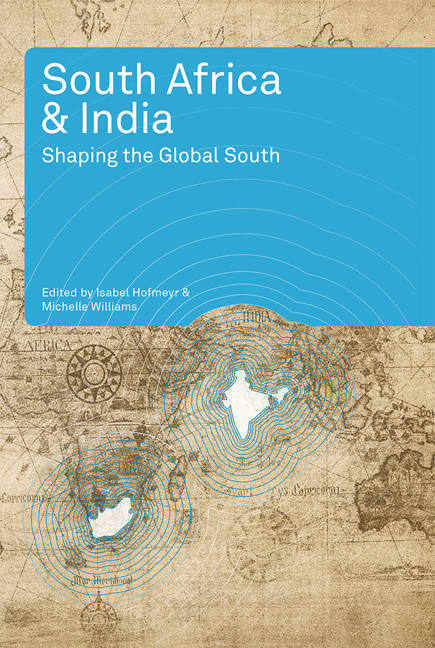Book contents
- Frontmatter
- Contents
- Acknowledgements
- Abbreviations and Acronyms
- Introduction
- Historical Connections
- Socio-political Comparisons
- Chapter 6 Renaissances, African and Modern: Gandhi as a Resource?
- Chapter 7 Democratic Deepening in India and South Africa
- Chapter 8 Local Democracy in Indian and South African Cities: A Comparative Literature Review
- Chapter 9 Reimagining Socialist Futures in South Africa and Kerala, India
- Chapter 10 Labour, Migrancy and Urbanisation in South Africa and India, 1900–60
- Conclusion
- Notes and References
- About the Authors
- Index
Chapter 8 - Local Democracy in Indian and South African Cities: A Comparative Literature Review
from Socio-political Comparisons
Published online by Cambridge University Press: 21 April 2018
- Frontmatter
- Contents
- Acknowledgements
- Abbreviations and Acronyms
- Introduction
- Historical Connections
- Socio-political Comparisons
- Chapter 6 Renaissances, African and Modern: Gandhi as a Resource?
- Chapter 7 Democratic Deepening in India and South Africa
- Chapter 8 Local Democracy in Indian and South African Cities: A Comparative Literature Review
- Chapter 9 Reimagining Socialist Futures in South Africa and Kerala, India
- Chapter 10 Labour, Migrancy and Urbanisation in South Africa and India, 1900–60
- Conclusion
- Notes and References
- About the Authors
- Index
Summary
Since the 1990s the local level has become an important arena of development of democracy in most countries of the world – in a move sometimes described as part of ‘the third wave of democratization’ (Huntington, 1992), paradoxically encouraged by both progressive movements seeking a form of grass-roots democracy and by the World Bank as a new form of governance. India and South Africa are no exception, and both countries implemented reforms of local government in the mid-1990s with the objective of broadening and deepening democracy.
This chapter aims at comparing the political and academic debates that took place in South Africa and India concerning decentralisation and, more broadly, local democracy in an urban context. We believe, with Hantrais (2009:72), that ‘the definition and understanding of concepts and the relationship between concepts and contexts are of critical concern in comparative research that crosses national, societal, cultural and linguistic boundaries’. Through a literature review and a contextualisation of local democracy's history, institutions and practices, this joint chapter aims at identifying the commonalities and differences in the political and social stakes contained in the debates on ‘local democracy’.
We define local democracy here as a set of democratic institutions and practices that are focussed on the local level (from the metropolitan level downwards to the ward and neighbourhood levels, for instance), and that can take two broad directions: decentralisation (local government authorities allow local votes to matter more than at a state/provincial or a national level, possibly leading to more accountability and a better adaptation to local needs by local politicians and officials); and participation (i.e. mechanisms for citizens to address the state between elections). These two dimensions do not necessarily coexist, even though, according to the World Bank, ‘[p]articipation and decentralization have a symbiotic relationship … participation [can be] a means to successful decentralization [or] … a goal of decentralization’. Our assumption is not that local governments and participation are inherently more ‘democratic’ (as justly pointed out by Purcell, 2006), but that they offer a potential for increased accountability and responsiveness by local politicians and officials to local citizens.
- Type
- Chapter
- Information
- South Africa and IndiaShaping the Global South, pp. 176 - 196Publisher: Wits University PressPrint publication year: 2011

